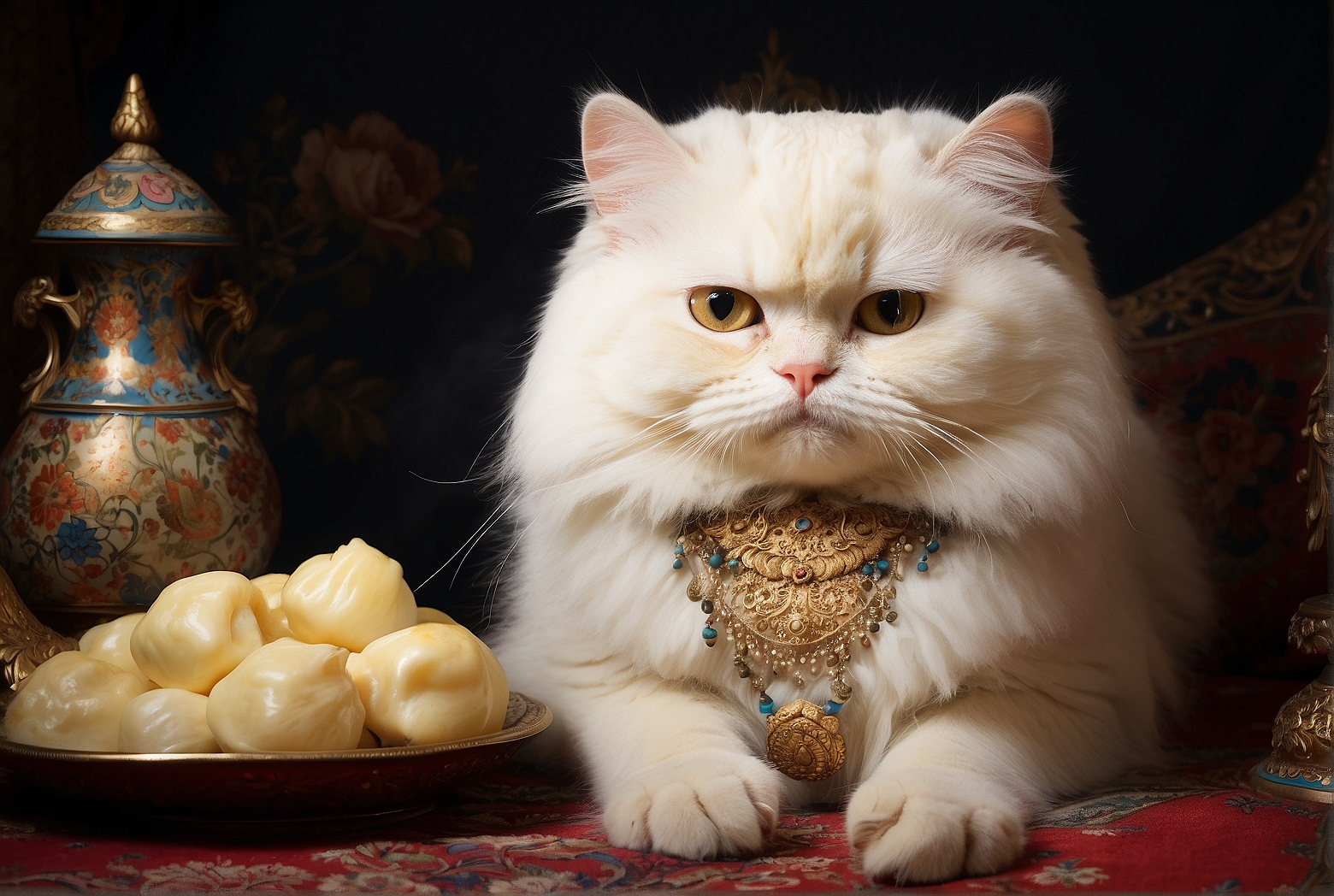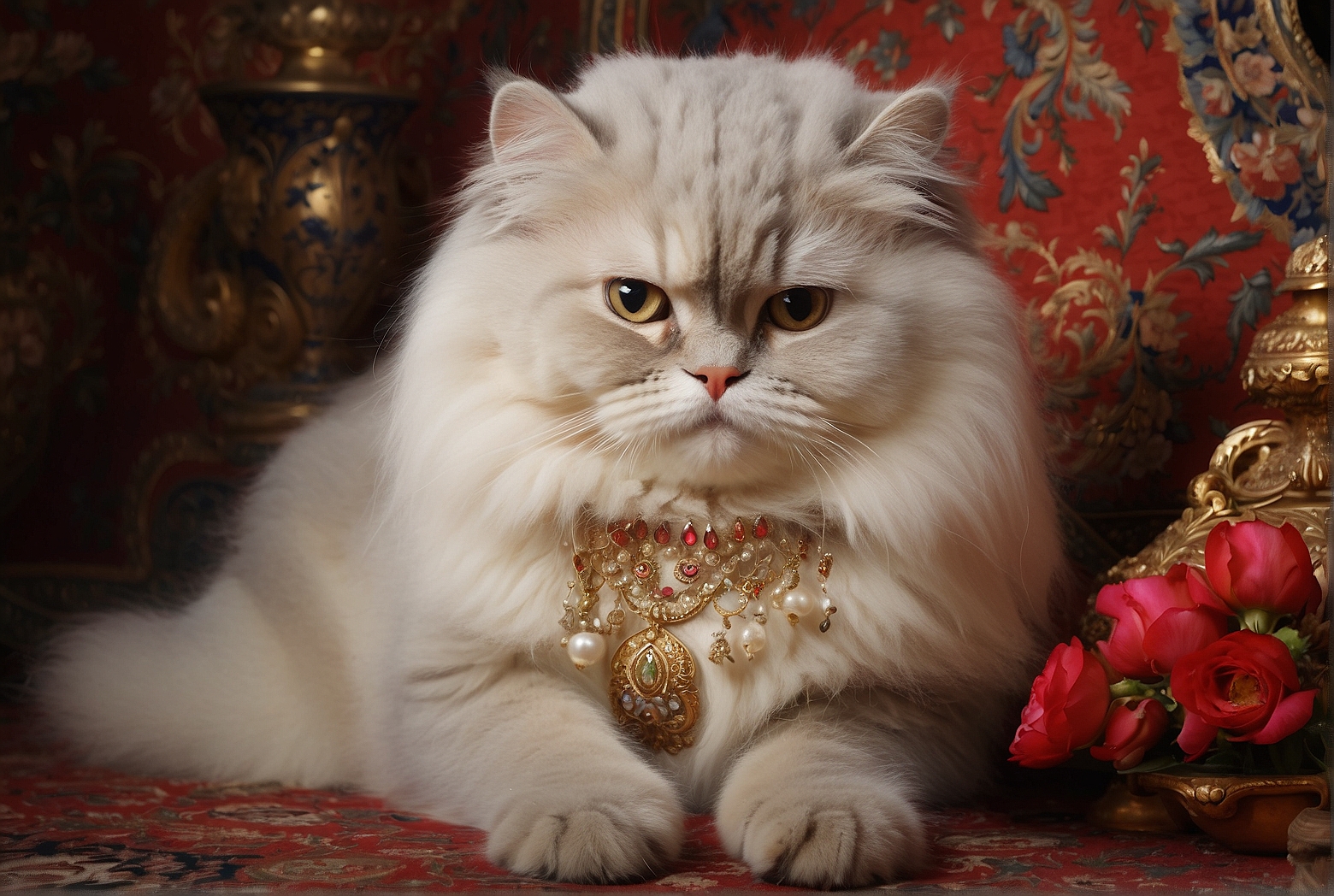If you’ve ever owned a Persian cat or are considering getting one, you may have heard rumors about their sensitive stomachs. In this article, we’ll explore the truth behind the claims and shed light on whether or not Persians truly have delicate digestive systems. Whether you’re a proud owner or simply curious about these gorgeous felines, read on to discover the facts about the often-discussed topic of Persian cats and their stomach health.
Persian Cats
Origin and Characteristics
Persian cats are one of the most popular and beloved cat breeds in the world. Originating from Persia, now Iran, these elegant and regal cats have captivated the hearts of cat lovers with their distinctive long and thick coats, small rounded ears, and expressive eyes. Persian cats are known for their calm and gentle personalities, making them excellent companions for individuals and families alike. They come in a wide variety of colors and patterns, adding to their beauty and charm.
Common Health Issues
While Persian cats are adored for their stunning appearance and docile nature, they are unfortunately prone to certain health issues. One of the most prevalent concerns among Persian cats is their sensitive stomachs. These felines can easily develop gastrointestinal problems, leading to digestive sensitivities and discomfort. It is crucial for owners to understand the causes, signs, and ways to manage these health issues for the well-being of their beloved Persian companions.
Grooming Requirements
One of the defining features of Persian cats is their beautiful long fur. However, this luxurious coat requires regular and meticulous grooming to maintain its splendor and prevent matting or tangling. Daily brushing is essential to remove loose hair, prevent the formation of hairballs, and keep the coat clean and free from debris. Additionally, periodic baths should be given to Persians to keep their coat healthy and shiny. Proper oral care is also essential to prevent dental issues common in this breed. By investing time and effort into grooming, owners can help maintain the digestive health and overall well-being of their Persian cats.
Understanding Sensitive Stomachs
Definition and Causes
When we talk about sensitive stomachs in Persian cats, we refer to a condition where the digestive system is easily upset or irritated, leading to frequent gastrointestinal disturbances. These cats may experience vomiting, diarrhea, flatulence, or abdominal discomfort. The causes of sensitive stomachs in Persians can vary and may be attributed to genetic factors, dietary issues, or environmental factors. It is important to identify the underlying cause to effectively manage and prevent further digestive issues.
Signs and Symptoms
Identifying the signs and symptoms of digestive sensitivity in Persian cats is crucial for early detection and intervention. Some common indicators include recurring bouts of vomiting or diarrhea, excessive gas or bloating, constipation, loss of appetite, weight loss, and general lethargy. If you notice any of these symptoms in your Persian cat, it is important to consult a veterinarian for a proper diagnosis and treatment plan.

Prevalence among Persian Cats
Sensitive stomachs are relatively common among Persian cats due to their unique physiology and genetic predisposition. The brachycephalic (flat-faced) structure of their faces can contribute to respiratory and gastrointestinal issues. Additionally, selective breeding over generations may have inadvertently intensified this sensitivity. It is estimated that a significant percentage of Persian cats experience some form of digestive sensitivity, making it a prevalent concern within this breed.
Factors Influencing Digestive Sensitivity
Breed Genetics
The genetics of Persian cats play a significant role in their susceptibility to digestive sensitivity. The selective breeding practices aimed at enhancing specific physical traits, such as the flat face and delicate features, may also inadvertently lead to increased vulnerability to gastrointestinal issues. It is important for cat breeders and owners to be aware of these genetic predispositions and take proactive measures to minimize the potential health risks.
Dietary Factors
Diet plays a crucial role in maintaining digestive health, and Persian cats are no exception. Feeding them a high-quality diet with the right balance of nutrients is essential for their overall well-being. However, Persians with sensitive stomachs may require special dietary considerations. They may benefit from a limited ingredient diet or a formula specifically designed for cats with digestive sensitivities. Additionally, avoiding common allergenic ingredients can help prevent adverse reactions.
Environmental Factors
The environment in which Persian cats live can also impact their digestive health. Stress and anxiety have been linked to gastrointestinal disturbances in cats, and Persians are no exception. Changes in routine, household dynamics, or exposure to new or unsettling stimuli can trigger digestive issues. Creating a calm and stress-free environment for your Persian cat, with plenty of opportunities for relaxation and play, can help minimize the risk of digestive sensitivity.
Dietary Considerations for Persian Cats
Choosing the Right Food
Selecting the appropriate food for Persian cats with sensitive stomachs is crucial for their digestive well-being. Look for high-quality cat foods that are easily digestible and formulated to support digestive health. These may include formulas with limited ingredients, novel protein sources, or prebiotics and probiotics to promote a healthy gut flora. Consult with your veterinarian to determine the most suitable dietary choice for your Persian cat.
Avoiding Common Allergens
Persian cats with sensitive stomachs are more likely to develop adverse reactions to certain common allergenic ingredients found in cat foods. These may include grains, chicken, beef, fish, or dairy products. It is essential to read the labels and choose cat food formulas that exclude these ingredients if your Persian has known sensitivities or allergies. Avoiding these allergens can significantly reduce the risk of digestive disturbances.

Managing Portion Sizes
Maintaining a healthy weight is crucial for the overall well-being of Persian cats, especially those with digestive sensitivity. Overfeeding can contribute to gastrointestinal issues, while underfeeding can lead to nutritional deficiencies. It is important to follow the serving size recommendations provided by the cat food manufacturer or consult with your veterinarian to ensure you are feeding your Persian cat the appropriate amount for their age, size, and activity level.
Food Allergies and Sensitivities in Persians
Common Allergenic Ingredients
Some Persian cats may suffer from food allergies or sensitivities, which can exacerbate digestive issues. Common allergenic ingredients include grains, such as wheat, corn, or soy, as well as proteins like chicken, beef, or fish. Identifying the specific allergens causing adverse reactions in your Persian cat can be challenging but is essential for their health. Your veterinarian may recommend a food trial or an elimination diet to pinpoint the problematic ingredients.
Cross-Reactivity with Environmental Allergens
In addition to food allergies, Persian cats may also experience cross-reactivity with environmental allergens, such as pollen, dust mites, or certain cleaning products. These allergens can worsen gastrointestinal symptoms in sensitive cats. Minimizing exposure to known environmental allergens and keeping their living environment clean and free from irritants can help reduce the risk of digestive issues.
Food Trials and Elimination Diets
If your Persian cat is suspected to have food allergies or sensitivities, your veterinarian may recommend a food trial or an elimination diet. These diagnostic approaches involve feeding your cat a limited number of novel protein and carbohydrate sources to identify the specific allergens causing adverse reactions. These trials can be time-consuming but are essential for pinpointing and managing your Persian’s food allergies or sensitivities effectively.
Preventing and Managing Digestive Issues
Regular Veterinary Check-ups
Regular veterinary check-ups are essential for maintaining the digestive health of Persian cats. Routine examinations allow the veterinarian to identify any underlying health issues or potential digestive sensitivities. They can also provide guidance on appropriate diets, supplements, or medications that may help prevent or manage digestive issues. By staying proactive and scheduling regular appointments, you can ensure the well-being of your Persian cat’s digestive system.
Probiotics and Digestive Supplements
Probiotics and digestive supplements can be valuable tools in promoting a healthy gut and managing digestive sensitivities in Persian cats. Probiotics help balance the gut flora, reducing inflammation and supporting proper digestion. Digestive enzymes and supplements can also aid in the breakdown and absorption of nutrients. Consult with your veterinarian to determine the most appropriate probiotics or supplements for your Persian cat’s specific needs.
Slow Transition to New Foods
When introducing new foods to your Persian cat, it is crucial to do so gradually to minimize digestive upset. Abrupt dietary changes can lead to stomach disturbances, such as vomiting or diarrhea. To prevent these issues, slowly incorporate the new food by mixing it with the old one over a span of several days. This gradual transition allows the cat’s digestive system to adjust, reducing the risk of gastrointestinal problems.
Gastrointestinal Diseases in Persian Cats
Irritable Bowel Syndrome (IBS)
Irritable Bowel Syndrome (IBS) is a common gastrointestinal disorder that can affect Persian cats. It is characterized by chronic inflammation and irritation of the intestinal lining, leading to symptoms such as abdominal pain, diarrhea, constipation, and flatulence. Managing IBS in Persians often involves dietary modifications, stress reduction, and symptomatic treatment prescribed by a veterinarian.
Gastritis
Gastritis, or inflammation of the stomach lining, can also occur in Persian cats. It can be caused by various factors, including infection, dietary indiscretion, or the use of certain medications. Symptoms of gastritis may include vomiting, loss of appetite, and abdominal discomfort. Treatment typically involves medication to reduce inflammation, dietary adjustments, and supportive care.
Pancreatitis
Pancreatitis is an inflammation of the pancreas that can occur in Persian cats. It can be acute or chronic and is often associated with other gastrointestinal issues. Symptoms of pancreatitis may include vomiting, diarrhea, abdominal pain, and decreased appetite. Treatment usually involves supportive care, including pain management, fluid therapy, and dietary modifications.
Grooming Techniques for Maintaining Digestive Health
Brushing and Detangling Fur
Regular brushing is essential for Persian cats to prevent matting and tangling of their long fur. Mats and knots can trap debris and cause skin irritation, leading to discomfort and potential digestive issues if ingested. Use a high-quality grooming brush or comb designed specifically for long-haired cats to gently remove loose hair and prevent tangles. Regular brushing promotes a healthy coat and reduces the risk of digestive disruptions caused by excessive grooming or hairball formation.
Preventing Hairballs
Hairballs are a common issue for Persian cats due to their long fur and grooming habits. When Persians groom themselves, they ingest loose hair, which can accumulate in their stomach and form hairballs. These hairballs can cause digestive discomfort, leading to bouts of vomiting or constipation. Regular brushing, along with the use of hairball prevention products or specialized diets, can help reduce the frequency and severity of hairball-related digestive issues.
Oral Care and Toothbrushing
It is important to prioritize oral care for Persian cats to maintain their overall digestive health. Poor dental hygiene can lead to periodontal disease or oral infections, which can impact their ability to eat and digest food properly. Regular toothbrushing with cat-safe toothpaste and dental check-ups can help prevent dental problems and ensure your Persian cat’s teeth and gums remain healthy. Good oral health contributes to optimal digestion and overall well-being.
Environmental Factors to Consider
Stress and Anxiety
Persian cats are known for their sensitive and gentle nature, making them more susceptible to stress and anxiety. Emotional disturbances can impact their digestive health, leading to gastrointestinal issues. It is important to provide a calm and stress-free environment for your Persian cat by avoiding loud noises, sudden changes in routine, or overcrowded living spaces. Creating a peaceful atmosphere helps promote optimal digestion and overall health for your feline companion.
Toxic Household Substances
Some common household substances can be toxic to Persian cats if ingested or exposed to their delicate systems. Certain plants, cleaning products, medications, or human foods can cause digestive disturbances and even organ damage. Ensure that your home is free from toxic substances or keep them safely out of reach. Regularly inspect your Persian cat’s living environment for potential hazards and consult with your veterinarian regarding safe and cat-friendly alternatives.
Ensuring a Clean Living Environment
Maintaining a clean and hygienic living environment is crucial for the digestive health of Persian cats. Dirty litter boxes, soiled bedding, or contaminated food and water bowls can contribute to digestive disturbances and the spread of harmful bacteria or parasites. Regularly clean and disinfect these areas, provide fresh water and high-quality food, and ensure proper waste management to minimize the risk of gastrointestinal issues.
Conclusion
Understanding the unique needs of Persian cats, especially their tendency towards digestive sensitivity, is vital for ensuring their well-being and a happy life. From choosing the right food and managing portion sizes to maintaining proper grooming techniques and creating a stress-free environment, there are many ways to support and improve the digestive health of your Persian cat. Regular veterinary care, appropriate dietary considerations, and proactive measures can help prevent and manage digestive issues, allowing your Persian companion to thrive and enjoy a comfortable and fulfilling life.
